Omar — the Palestinian: Hany Abu-Assad Calls It “Othello — the Occupation”
By Diane Sippl
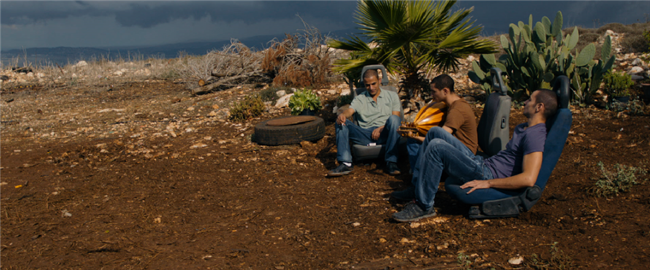
The danger was just as a filmmaker: first, to get the audience engaged; and second, to give them space to think.
— Hany Abu-Assad, Writer-Director, Omar
Premiering in Hollywood at the 2013 AFI FEST Presented by Audi, Omar is the second of writer-director Hany Abu-Assad’s works to be nominated for the Best Foreign-Language Film at the Academy Awards. His first was Paradise Now (2005), which actually won in the same category at the Golden Globes. Winning kudos at the AFI FEST and a grand send-off from Los Angeles' top film festival and showcase of new international cinema, Abu-Assad, along with two of the film’s actors, including the co-producer Waleed Zuaiter and newcomer Leem Lubany, certainly swelled the turnout and primed filmgoers, both fans and skeptics alike, for a healthy round of questions about life in the West Bank as portrayed in the director’s first all-Palestinian feature. (In fact, it’s the first time the Academy has listed an entry into the competition as a film from “Palestine” per se). Yet again, a week into Omar’s theatrical run at Laemmle’s Royal Theatre in West Los Angeles, word is out, and most likely the early crowd (along with many turned away in dismay) was simply testament to the strength of the film as a work of art, an enthralling wide-screen drama of our times bearing classical storytelling and thespian verve. Shot on location in Nazareth, Nablus, and Bisan with “first-feature” credits for most of the cast and crew, the work is all the more impressive, and the risks taken and fulfilled, all the more stunning.
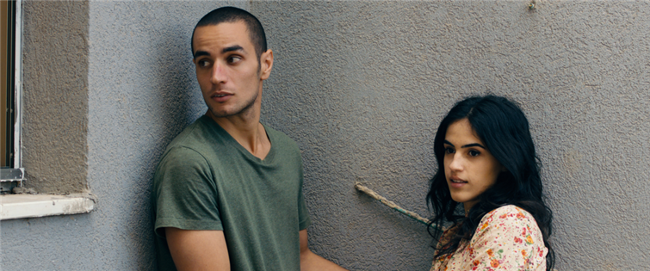
“I planned it; Omar stole the car; so you shoot,” Tarek tells Amjad, the youngest of three Palestinian friends, who resists being initiated into violence. He’d rather play his oud and tell jokes. He has seven sisters to support, and “none of them is pretty,” he tells his cronies. “They’re on special today — take one, get one free.” But he shouldn’t be joking about this, especially because he himself is head-over-heels for Nadja, Tarek’s sister, and it will take some piece of work to win her hand. For one thing, he has a secret contender who’s a lot better at writing love notes than he is.
Omar is more easily enlisted in Tarek’s mission than Amjad is: “Every day we wait,” he stresses, “is one more day of occupation.” Tender-hearted as he is, Omar feels compelled to fight for freedom.
“Know how they catch monkeys in Africa?” Amjad taunts, telling another not-so-funny joke about the “friendly” art of persuasion. That one resonates until the very end of the film. When Omar, who climbs over the wall from his job as a baker to visit Nadja one too many times, he’s nabbed after the trio’s successful killing of an Israeli soldier. Omar is detained and tortured so as to name “names.”
At lunch in the cafeteria, a fellow prisoner sidles up to him: “They will try to befriend you,” he warns, ‘trick you into confessing. Don’t, or you’ll be theirs forever. They’ll never leave you alone.”
“I’ll never confess,” Omar replies with a vengeance, but it’s not good enough. He’s released only as an informer, and sooner than later, Tarek, Omar’s best friend and the older brother of Nadja, his beloved, turns cold with him as they plan their next ambush.
“There’s a traitor among us,” Tarek decries soberly, not knowing where to point the finger. The question is, who is it? We’ve seen the daily moves of Omar on both sides of the wall. We’ve heard his reports. We know his heart and soul — at least we think so, at least as much as he does himself. But as the pressure mounts for him to stay out of a 90-year prison sentence behind Israeli bars and to be loyal to his cronies at the same time, we can never be sure what he will do. Matters get more and more complicated and the “truth” clouds up.
“I was weak. I’m so sorry… forgive me,” cries Nadja to Omar, further down the line. “The times were bigger than me.”
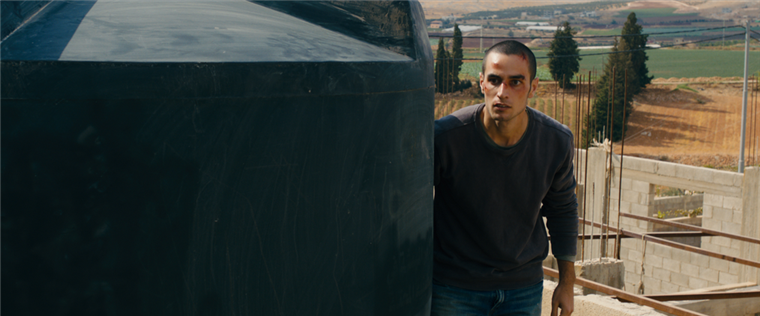
What makes Omar such a compelling drama is that notwithstanding the fundamental lie at its core, it is so truthful. From Omar’s point of view and that of Ehab Assal’s wide-screen lensing, we bear witness to the daily lives of Palestinians divided from each other and even within themselves. Omar is shot at, wounded, harassed, or detained each time we see him scale the wall, and finally it becomes physically insurmountable for him. The wall is more than an abstraction of life and death barriers — it’s concrete as well, as is the small rock in the sun that the soldiers force Omar to stand on as they arrest and taunt him early on in the story. When he resists the abuse, they force him at gunpoint to stand on it with only one leg. The image symbolizes the modicum of space — socially, politically, economically, and even psychologically — to which the Palestinians have been confined with the spread of Israeli settlements, and it attests to the severely restricted capacities with which Palestinians are left to function. Yet with Omar upon it, that rock becomes the Rock of Gibraltar, or better said, Jabal Tariq.
A handheld camera follows Omar through the tightest alleys, sneaking through “safe houses,” leaping from rooftops and sliding down exterior fixtures like Zorro, cutting corners and running into cul-de-sacs of new construction sites. In contrast, the house he has found for a future with Nadja looks just like the promise on the city billboards of “hope” and a “new start”; it has a pink flowered garden, even if it’s only on the wallpaper. More real is the talk Omar has with the ants from an extremely low, lateral angle as he lies on the prison floor with an eye-line match in point of view, even though his dialogue is with an absent Nadja. Eschewing cliché sex scenes, the film makes Omar’s and Nadja’s attraction concrete by proffering a classical exchange of love letters that they fold up into tiny parcels (also symbolic of their confined space) and exchange Romeo-and-Juliet-style. Sensuality radiates from the bread Omar bakes in the open-flame oven, the round forms swelling like domes as the temperature rises, or as the heat comes down. Nadja’s schoolgirl blushes are sincere and winning.
As for Omar, he’s always either in hiding or in silence. Beyond his clandestine “paper courtship” of Nadja, he’s ironically a guerrilla resistance fighter who keeps both his informer status hidden from his Palestinian compatriots and his revenge plans hidden from his Israeli enemies. He is entirely circumscribed by silence: he can’t give Nadja the one answer she wants; he can’t confront her when rumors smack him in the face; he can’t challenge her apparent but sudden change of heart; and he can’t reveal to her the lies she believes. In the dramatic heft he pulls from his tender eyes and vulnerable voice — an inner flame in the midst of social and emotional torment — Adam Bakri’s performance as Omar recalls those of a young Montgomery Clift. (Like Clift and that other “method” actor, Marlon Brando, whom Omar’s crony, Amjad, mimics in the film, Adam Bakri studied at the Lee Strasberg Theatre and Film Institute in New York). But Bakri needs no alter-ego for his Romeo appeal and his modern-day dilemma. His talent as a tragedian is of its own ilk.
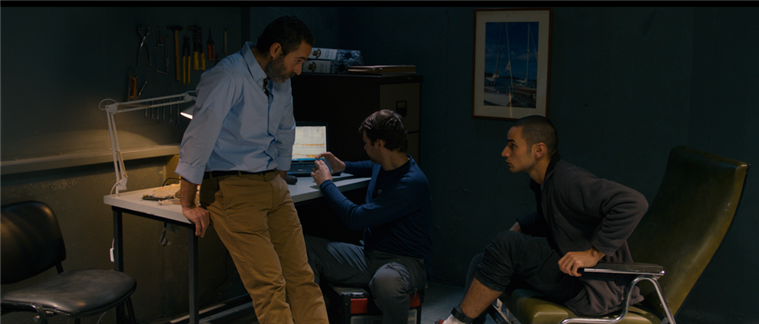
Viewers often wonder about the sources of Hany Abu-Assad’s stories. For all their timeliness and bearing of authenticity, are they drawn directly from life? For all their twists as thrillers and their tragic unity of time and place, are they crafted in his imagination?
Some years ago in Ramallah, his close friend confided in him an attempt at blackmail by a government agent who had held that friend’s personal secret, so tried to coerce the man into collaborating. “Upon hearing this,” reflected Abu-Assad, “I knew I had to delve into this subject, to explore how such circumstances and actions would affect love, friendship, and trust.”
The account goes back even further for Abu-Assad: “When I was shooting Paradise Now,” he told viewers at the Royal, “I got paranoid and felt there was a traitor inside the production. Who was it? When you get paranoid, you believe things that aren’t true. In four hours, in a panic, I came up with the structure of Omar, and in four days, it was the script it is now.”
A woman in the audience observed, “I thought this film would be about the West Bank, about life for Palestinians. You’ve made the same movie as Paradise Now.”
The response was multi-layered: “You mean I’m the same director. This film’s writing is more mature. Each scene leads to the next emotionally. Each scene comes from within the conflict.”
“I wanted to write about this crisis of paranoia. What was the best way to make paranoia universal? Love — because if love’s involved, you feel insecure. Then I needed a brother, in the Resistance. And I needed a traitor, one also involved with Nadja, a beauty so innocent that anyone who looks at her finds an intriguing sadness in her eyes. Any sane person wouldn’t believe what is said about Nadija, but Omar is paranoid, so he accepts what his friend Amjad tells him as true. And the only way Omar can redeem himself is to kill the enemy and sacrifice himself to Nadja. She’ll have a husband and a family — in ignorance. I didn’t want to tell the audience what was in the letter from Omar to Nadja, what to imagine he wrote to her, but he didn’t want to tell her the truth because it would ruin her life, and Omar wants to give her a kind of peace.”
Another viewer asked, “Why didn’t Omar ask Nadja about the truth with Amjad?”
The director pointed out his writing strategy. “It was deliberate. In any drama, you need the sinner to discover his sin. He didn’t even question the question, even his rational thinking. He just believed it. He lost his mind.”
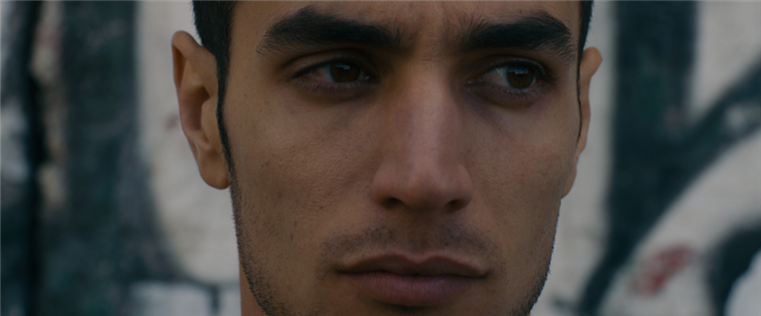
One of the first questions filling any viewer’s mind a minute into the action is, “What were the stakes in shooting this film?” The danger on the screen is palpable. Wasn’t there danger in making it?
The director surprises us. “No, that was Paradise Now. This one was all approved. The danger was just as a filmmaker: first, to get the audience engaged; and second, to give them space to think. The danger was in failing in either of these. Well, we were accepted into the Cannes Film Festival — not every film is.”
The director is no stranger to Cannes, where international coteries of critics and juries are likely to hold orientations to the Occupation that diverge from U.S. policy. For example, the “wall” in Omar is a fateful force. Israelis commonly refer to it as a “security fence,” Palestinians as the “apartheid wall,” the BBC as a “separation barrier,” and Hany Abu-Assad as “the Isolation Wall.” About ten percent of the barrier thus far, generally in urban settings, consists of an actual wall such as seen in the film, made of concrete slabs about 26 feet tall and 10 feet wide, constructed with automated sensing devices and observation posts at regular intervals, all controlled by armed Israeli soldiers who guard the gates and shoot at offenders. These walls prevent Palestinians from moving freely to and from their work sites not only in Israel but also within the West Bank, even for subsistence labor.
“The Isolation Wall creates cantons where Palestinians live,” says Abu-Assad. “The wall is not being built as a border between Israel and the West Bank, but is actually being built in a way that separates Palestinians from themselves; sometimes it even divides a Palestinian town into two parts. This is why jumping the wall is a daily occurrence and people do it for a myriad of reasons: work, family, survival — and love is not an exception. In many places it isn’t clear what is and what isn’t occupied… for instance, in Jerusalem, both sides are occupied.”
“My intention was to create a virtual Palestinian city where the wall is just randomly crossing the city, village, and refugee camp, with no differences between the two sides. Shooting Omar took one week in Nablus, six weeks in Nazareth, and one week in Bisan. This time we had no resistance to shooting where we wanted; we managed to get permission for all the places, even the wall. For the wall, we had permission to climb up to a certain height and then, for the moments at the top, we used a fake wall on a set in Nazareth.
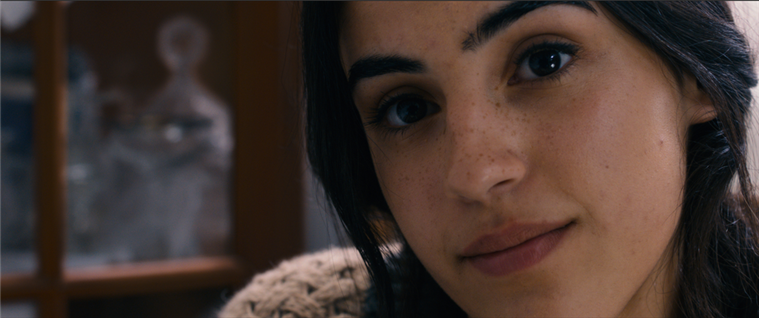
Many in the audience wondered how Waleed Zuaiter, with his perfect English, managed to become a producer of the film.
“Hany sent me the script because he thought I’d be good in the role of Agent Rami. I loved it, but I loved a lot more about it than just the role,” he explained. The prolific Palestinian-American stage, screen, and television actor was born in Sacramento, grew up in Kuwait, studied in the U.S., and now lives in Los Angeles.
“My brothers wanted to do something to create jobs for Palestinians, and we were all proud of Paradise Now,” he continued. “So with my brothers as anchors, we reached out to the community. It wasn’t always so easy raising money, for several reasons. First of all, it was an independent production. Second, it was being made in a foreign language — actually two, Arabic and Hebrew. But also, it was a Palestinian production, and the financiers insisted on a completion bond because of the risk of shooting in the West Bank. We all wanted to put Palestine on the map. For almost everyone in the key crew positions, it was the first time holding such a position.”
Omar, a film of immense international significance, is also an extremely intimate film, especially in the least expected way, in the exchange between Zuaiter’s Israeli Agent Rami and Omar. Close-ups are not reserved for the romantic couple and the bonded Palestinian “brothers” but also lend an intimacy to the exchanges between the two enemies.
Zuaiter told viewers, “I asked Hany, ‘What’s the difference between Rami and the Palestinian “prisoner” as we see that man first approach Omar in the cafeteria?’ And Hany said, ‘Nothing. He’s the same guy. He doesn’t lie. Nothing he says to Omar is a lie.’”
“Hany writes in his script only the stage directions that are necessary. So he asks a lot of his actors, who are free to bring to the characters what they imagine for their roles,” Zuaiter continued. “The script was only 72 pages. I’d never read a feature script so fast. It was a 41-day shoot.”
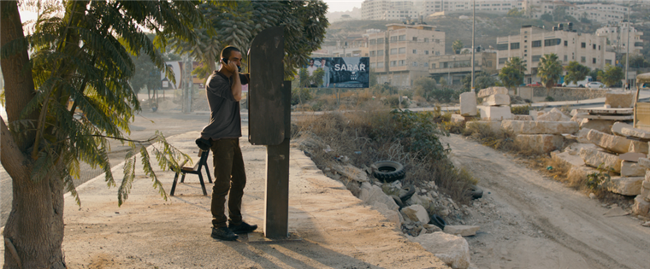
Leem Lubany, who plays Nadja, the female lead in the film, told the audience, “I live in Nazareth, and life is easier there, but I’m Palestinian, so I could relate to the film and identify with the character.”
Hany Abu-Assad, congratulating her once again on her performance, chimed in, “She was 16 when we set out, and she auditioned with her mom present. Once we were in production, she didn’t want her mom to leave.”
In a Director’s Statement Hany Abu-Assad has explained, “I will never make a film that solely condemns or solely defends human beings. I leave that to the courts of justice around the world. The human side of freedom fighters is what intrigues me… or the human side of any character, since often what makes us human is also a tragic flaw. Many people or characters, whether freedom fighters or lovers, appear perfect on the outside, but the tragic flaw means that this perfection is only a perception; inside these people is imperfection and failure. My job as a filmmaker is to be intrigued by this phenomenon and to show it in the most honest way, a way that is gray, and not black and white.
A week before the Oscars, filmmaker Hany Abu-Assad made his position very clear for the audience at-hand. The ringing message was: “Omar is first and for all a love story. I know the Occupation will die sooner or later, but I want to make a movie that will last beyond the Occupation, like Casa Blanca, which still does very well. Omar is a modern version of Othello; I call it, “Othello — the Occupation.”
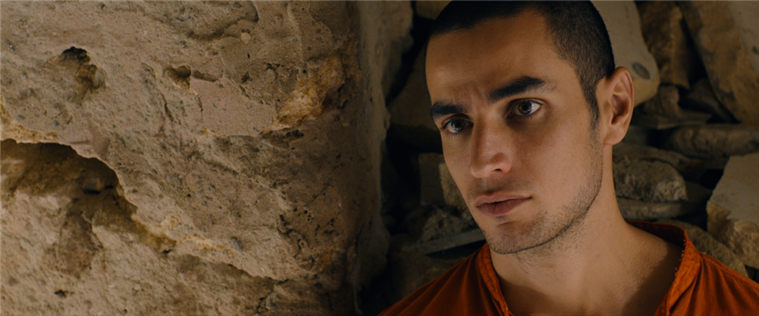
Omar
Director: Hany Abu-Assad; Producers: Hany Abu-Assad, Waleed Zuaiter, David Gerson; Screenplay: Hany Abu-Assad; Cinematographer: Ehab Assal; Editors: Martin Brinkler A.C.E., Eyas Salman; Sound: Raja Dubayah; Production Design: Nael Kanj; Costumes: Hamada Atallah.
Cast: Adam Bakri, Leem Lubany, Waleed Zuaiter, Samer Bisharat, Eyad Hourani.
Color, Alexa HD widescreen, 98 min. In Arabic and Hebrew with English subtitles.